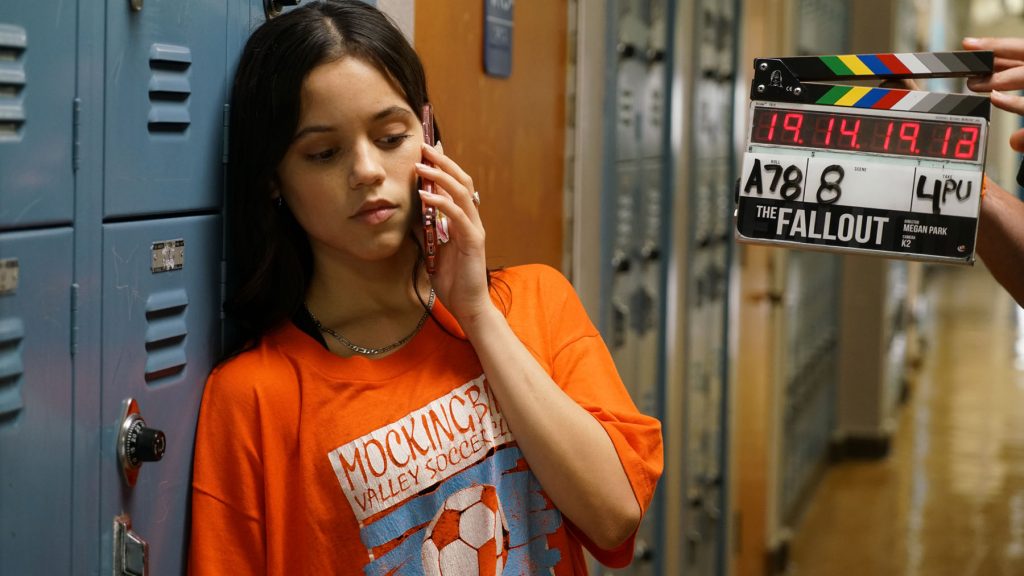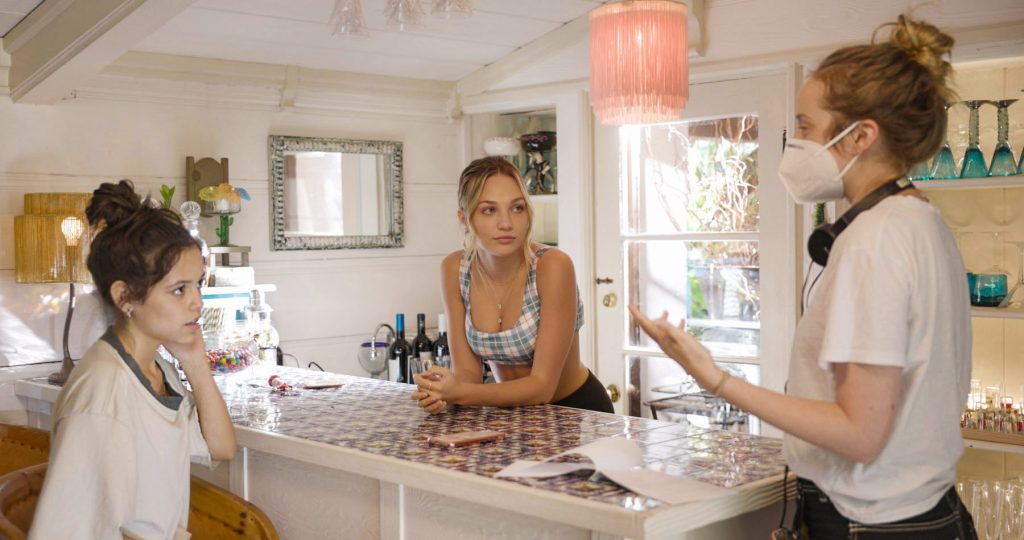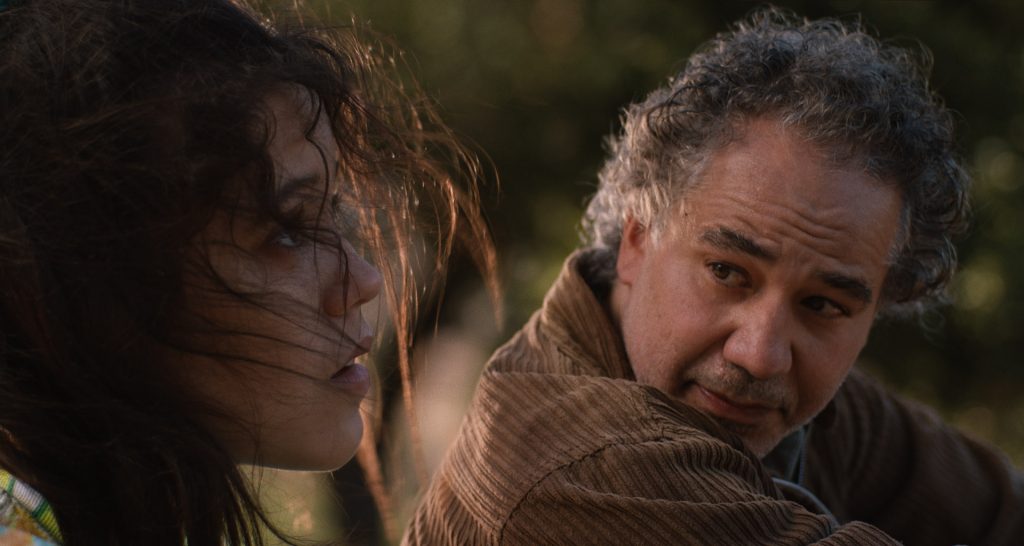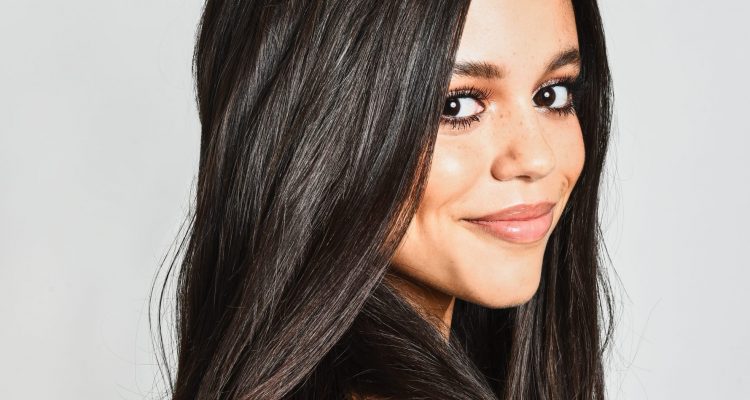Nineteen-year-old actress Jenna Ortega is halfway through the biggest year in her career, having just wrapped a lengthy production in Romania where she stars as Wednesday Addams for director Tim Burton.
The quirky family was first introduced in 1964 as a television series before being adapted as a trio of live-action films in the 1990s. But, unlike its predecessors, Burton and Netflix’s Wednesday series centers on the family’s daughter, Wednesday, who is mastering her psychic powers while navigating new relationships as a high school student.
“Wednesday Addams isn’t just another teenager,” explains Ortega. “Tim [Burton] and I had a lot of visual conversations in terms of setting the look. We didn’t know that we wanted to give her a fringe originally, but there had to be something that set her apart, both in terms of performance and visually.”
Ortega is back in the press for HBO Max’s acclaimed indie drama, The Fallout, which had its premiere at South by Southwest in 2021. Written and directed by Megan Park, the film follows the emotional journey of high schooler Vada after she survives a school shooting. While some students respond with activism, Vada forms new connections with classmates Mia (Maddie Ziegler) and Quinton (Stranger Thing’s Niles Fitch) and withdraws into self-medication and displacement while trying to regain her balance.
The Latina actress effortlessly carries the trauma of a teenager processing her grief in the aftermath of the tragedy. “There is a timelessness to [the film], and it was part of the reason I was so scared to take on the project… I didn’t want to feel like I was inserting myself in somebody else’s deeply tragic and awful story and claiming it as my own,” admits Ortega. “I wanted to make sure that when we did this, it was approached with sensitivity and thoughtfulness.”
Having starred in Ti West’s 70’s horror film X, the latest film in the Scream franchise, and Netflix’s psychological thriller You, Ortega, who has never had acting coaching, is tackling an array of challenging roles that showcase the scope of her career to come.
“When I’m reading scripts, I typically know quickly whether it’s something I want to be a part of because I read a lot,” shares Ortega. “When it’s really great writing, my job’s kind of done for me. I know exactly who that person is, what my job is as an actor, and what I need to perform.”
Ortega spoke with Awards Focus about the unfortunate recurring relevance of The Fallout, working with first-time writer/director Megan Park, improvising scenes with Maddie Ziegler, and collaborating with Tim Burton to visually characterize Wednesday Addams as a teenager.

Awards Focus: There’s an unfortunate timelessness to The Fallout because it’s so pertinent, particularly with frequent mass shootings in the US. Were you surprised by how strongly the film was received?
Jenna Ortega: You’re right. There is a timelessness to the film. I was so scared to take on the project because I didn’t want to feel like I was inserting myself into somebody else’s deeply tragic and awful story and claiming it as my own.
I wanted to make sure that when we did this, it was approached with sensitivity and thoughtfulness. Something that surprised me when the movie came out because I didn’t know how people would feel about it was actual school shooting victims reaching out and thanking us for making the movie in the first place. Of course, it wasn’t everybody, but it was really surreal to see.
Some people even left a note saying they didn’t consider the possibility that this isn’t something that just goes away. Some people have to sit around and dwell in it.
These shootings keep happening repeatedly, and I don’t know when something will be done. I don’t understand why nobody is doing anything. It’s really frustrating because I don’t want another movie like this to have to be made. People will keep doing it, and it makes me upset.
AF: Were you talking with survivors before filming to help inform Vada’s journey and how they processed their trauma?
Ortega: It’s crazy that March for our Lives is kicking off again because I was super active in 2018. Through the activism scene, I met with Parkland victims, and I was able to talk with them firsthand to understand their experiences, what they’re trying to move past and what they’re trying to do now.
While filming The Fallout, I didn’t reach out to anybody because I didn’t want to bring up somebody else’s trauma for my own benefit. I didn’t want to make someone talk about their most traumatic experiences to a stranger, so I did what I could.
Unfortunately, because this has happened so often, there’s so much footage with interviews or people like Vada speaking about their own experiences and how they affected them. I watched as many videos as possible, and it feels weird, but it’s true.

AF: When reading material, what are you looking for when considering your next project?
Ortega: When I’m reading scripts, I typically know quickly whether it’s something I want to be a part of because I read a lot. So if I start putting down the script about 20 pages to do something else, it’s probably not something I’m interested in doing.
You just kind of know because it makes sense. If I read it in one sitting, I want to meet with people and discuss it more, and when it’s really great writing, my job’s kind of done for me. I know exactly who that person is, what my job is as an actor, and what I need to perform.
AF: Can you talk about your first meeting with The Fallout director Megan Park and what made you jump on board the project?
Ortega: I was pretty impressed because I didn’t realize it was her first script. I feel like dialogue can be hard to write and make sound natural, and Megan captured Gen Z better than I think I could’ve.
The Fallout came to me through a mutual friend who recommended me for the part. I love indie dramas; it was another opportunity, and I wasn’t getting many of those at the time, especially to lead a story. Typically they want someone with star power, and there’s the politics of it all, so it was an exciting opportunity for me.
AF: The dynamic between your character Vada and Maddie Ziegler’s Mia is so natural that some scenes seem improvised. Were you both able to explore the relationship between the character’s outside what was written in the script?
Ortega: [laughs] There was so much improvisation. I’m almost embarrassed to reveal what was and what was not.
Because it was the pandemic, Maddie and I didn’t really get to hang out. We hung out maybe once before shooting and sat and talked for 12 hours. From then on, it felt like Mia’s and Vada’s relationship was set. We didn’t rehearse scenes. Sometimes it was more about staying in the mood.
The incredible thing about working with Megan was that it was her first time directing. She was so good with everyone, and finding a good actors’ director is hard. We would always do a take, and then at the end, she would say, “Okay, Jenna, do a fun one. Say whatever you want.” If it meant that we had to reshoot it because Megan liked it, then we would do that.
There’s a scene where Mia and Vada are dancing in a parking lot drunk, and in between takes, I was pushing Maddie around, and we were shouting and playing just to keep it going. Megan would see us and always say, “Film up again! Film up again!” She captured these moments, and it was just alternate versions of ourselves, communicating, engaging, and navigating this loss.

AF: The scene in the school bathroom with you, Maddie, and Niles Fitch hiding in the stall together is so uncomfortable and intense. What was it like preparing for that scene together?
Ortega: Preparing for that scene was weird because I don’t typically prepare. I like to walk into things and wing them because otherwise, I can’t focus. I’ve never been coached because if I get somebody else’s ideas in my head, I can’t let go.
But there were two scenes in this film where I would just break out into tears at random times. It was the therapy scene where at the end, I would just be walking around my apartment and cry just to make sure I had it. The bathroom stall scene was one of those too, and nothing can really prepare you for something like that.
I think it was also Maddie’s last day of shooting, so we had already gone through the ups and downs. Then suddenly, we were going into the scene we’d been talking about the entire time, which was really weird.
Typically there was a fun rapport on set. People try to keep things light because we were dealing with such a heavy subject, but that one day, we all cut the chit-chat. Everybody was quiet. I wasn’t talking to anybody. We all sat in our respective corners and dealt with what we were filming because that’s the harsh reality. I thought they’re going to say wrap, and then I’m going to leave this here.
AF: Were you able to do that and leave it there on set?
Ortega: I did not leave it there. I was active after Parkland, and I cared immensely, but it’s different when you put it to an experience and try to put yourself in their shoes a bit more.
I also learned much more about that side of things during production because I did so much research. I was trying to get as close as possible to it. So, it’s not the same. I couldn’t just leave it.

AF: In director Ti West’s horror film X, you play a character who is curious about the film her boyfriend is directing. Can you talk about what that was like to film a role where you’re locked in a cellar, screaming for help, and having your fingers chopped off?
Ortega: X is one of my favorite things I’ve ever done. I loved it because Ti wrote and directed it; it almost felt like he had been waiting to make this for a long time. He was easily one of the most prepared directors I’ve ever worked with.
When it came down to the cellar and that scream, it came easily because I knew exactly what he wanted. We maybe did that scream three times, and I don’t remember cutting. We just reset each time.
Then I had prosthetics, and my hand was getting smacked. It was like another day at work; they just covered you in a lot more sweat and blood.
AF: You’re starring as Wednesday Addams in Tim Burton’s new Netflix series. What were the discussions about characterizing Wednesday now that she’s a teenager in school?
Ortega: That was definitely a big fear of mine. Someone can make dark comments or have a lot of attitude, and it’s funny and charming when it’s a 10-year-old girl. But once they’re 16, there’s a point where that kind of behavior is unacceptable. So how do you charm an audience while completely obliterating everybody in your path?
There were also conversations about the fact that we have never seen so much of Wednesday on camera because this show is Wednesday in every scene. How can you spend so much time with somebody and not get bored of them?
A great thing about Wednesday is she’s unexpected. You never know what she’s going to say or do next. To keep the charm alive, you realize there has to be some sort of emotional arc or dimension. I remember we would have so many conversations with the writers and director on set where Wednesday wouldn’t do this or that, but can we do this? It was a lot more technical than you would’ve expected.
But Wednesday Addams isn’t just another teenager. Tim and I had a lot of visual conversations in terms of setting the look. We didn’t know that we wanted to give her a fringe originally, but there had to be something that set her apart, both in terms of performance and visually. So Wednesday’s outfits are a bit more modern and contemporary than they have been in the past because who is Wednesday in this decade?


